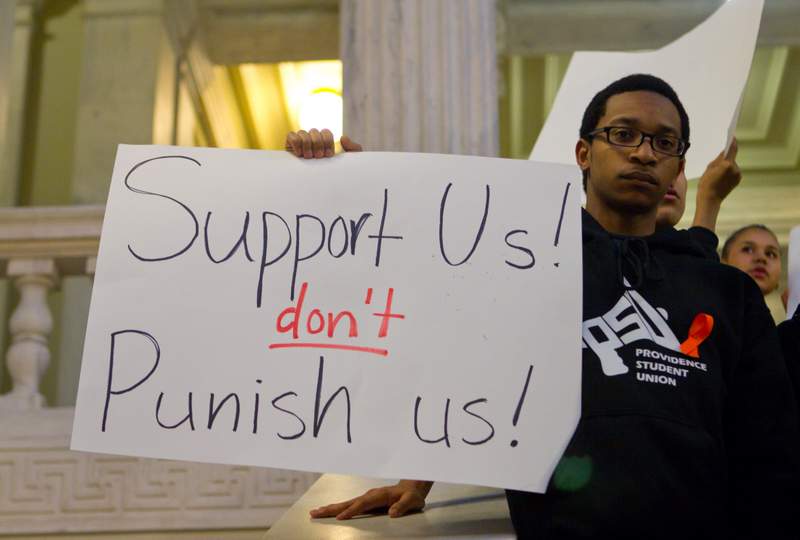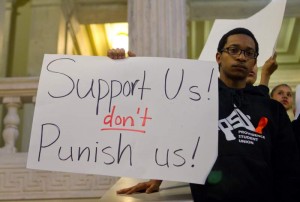 As it turns out, what most would think is the most mundane of duties of the R.I. House of Representatives – setting their own rules – is a fascinating exercise in recognizing who holds power, and those who seek to break the existing power structure and/or make that power structure more accountable and transparent.
As it turns out, what most would think is the most mundane of duties of the R.I. House of Representatives – setting their own rules – is a fascinating exercise in recognizing who holds power, and those who seek to break the existing power structure and/or make that power structure more accountable and transparent.
For those who don’t know, any public bill submitted to R.I. House invariably moves to a committee. While the bill is in committee, committee members review the bills and offer what are called SUB A’s, in legislative parlance. These SUB A’s usually involve minor changes in language, or the striking and/or replacement of text. Once the bill is amended, the committee votes to move the bill to the floor of the House. When the bill reaches the floor, members can offer what they call floor amendments. These amendments, which also usually involve minor changes in language, or the striking and/or replacement of text, are subject to a straight up or down vote as to whether to be included in the bill.
At first glance, the House Rules bill submitted to the floor by Deputy Majority leaders Arthur Corvese and Samuel Azzinaro seems like pretty standard legislation. After all, they are just setting the rules by which they are governed, right? Again, a pretty straightforward bill, including language that would dictate that no bill should be brought before the House after 10:30 p.m. on any given legislative day, unless the Majority leader and Minority leader agree, or a majority of the members vote, to suspend the rule.
The real drama, and struggle to hold at bay those who hold nearly unchecked power in Rhode Island, comes when the members of the Minority (Republicans) seek to add floor amendments to the bill.
According to the existing rules of the House, a bill that is submitted is subject to 5 possible votes by the members.
- A motion to report the bill or resolution to the House with a recommendation of passage
- A motion to report the bill or resolution as amended, or in substitute form, to the House with a recommendation of passage
- A motion to report the bill or resolution to the House without recommendation
- A motion to report the bill or resolution to the House with a recommendation of no passage
- A motion to report the bill or resolution to the House with a recommendation that it be held for further study
On February 26th, 5 floor amendments to the Majority sponsored House rules bill were proposed by the House Minority.
One by Representative Spencer Dickinson, which was withdrawn immediately after introduction.
One by Minority Leader Brian Newberry, which would have disallowed the House to vote to hold bills introduced on the floor for further study, instead making the members hold an up-or-down vote on any bill currently on the floor.
A compromise amendment by Rep. Doreen Costa, which would have set the cutoff for new bills introduced to the floor at 11:00 p.m., splitting the difference between the original 11:30 cutoff and the proposed 10:30 cutoff.
Two amendments submitted by Rep. J. Patrick O’Neill, one to eliminate the suspension of any rule by agreement of the Majority and Minority leaders, and requiring a two-thirds majority vote to suspend, and one to publish electronically( i.e. on the web) any bill in it’s exact form to be voted on at least 24 hours before the vote.
Minority leader Newberry took exception to the original bill’s language concerning the suspension of rules by agreement of the Majority and Minority leaders saying, “This puts too much power in the hands of the Leaders.” Rep. Nicholas Matiello countered by saying that regardless of who the leaders might be, the bill, “…leads to efficiency.”
In defending his amendment to eliminate the ‘Held for further study’ vote, Newberry said, “Every bill that comes to this floor deserves an up or down vote.” Corvese insisted that, “Just as important as the bills we pass, are the bills that we kill.”
Newberry rightfully pointed out that, even without the vote to hold a bill for further study, the sponsor can pull the bill at any time. “This held for further study, more often than not, is used to avoid a vote on an unpopular bill.”
While defending Rep. O’Neill’s amendment to require 24 hour public notice on the exact language of a bill to be voted on, Newberry said, “Sometimes we get these copies, and they’re still warm from the copier.”
Things degraded a bit at this point, and Rep. Helio Melo took a personal swipe at Newberry saying, “Maybe your copy is hot because you just show up to vote.” He claimed that, regardless of the time between finalizing a bills language and voting, the public is informed because, “They can watch the proceedings on Channel 15,” forgetting to add, ‘unless they don’t have cable TV.’
All of the floor amendments were voted down, and the bill passed as submitted.
According to Common Cause RI’s John Marion, the state’s go-to guy on open government and fair elections, “Today , what we saw was the difference between substance and symbolism.”
“The Majority offered the symbolic 10:30 curfew, which would only come in to play on a couple of nights during the session. Both Newberry’s proposal to eliminate the ‘held for further study’ vote, and O’Neill’s 24 hour public notice on the final language of a bill before a vote would come into play nearly every day of the session.”
Sorry, RI Future readers, House Democrats came down on the wrong side of open government and public notice on this one. Unfortunately, these rules are enacted through the 2014 session.
Correction: In the initial version of this article, I had confused the SUB A’s, which are only submitted to committees, and the floor amendments, which are submitted on the floor on the day that the bill is being heard by the full house. I was informed of this mistake by Rep. Newberry, who agreed with the tone and thrust of the article, and the main sponsor Rep. Corvese, who didn’t disagree with the tone or thrust, he simply told me that I, “… have no idea what a SUB A is.” John Marion from Common Cause RI must have thought it was ok, because he retweeted a link almost as soon as it hit the web.
The changes have been made, and I apologize but, cut me some slack. It was my first day on the job.
 Good for state Senator David Bates, a Republican from Barrington, who seems to have a pretty reasonably position when it comes to public sector cash assistance programs for the needy.
Good for state Senator David Bates, a Republican from Barrington, who seems to have a pretty reasonably position when it comes to public sector cash assistance programs for the needy.








